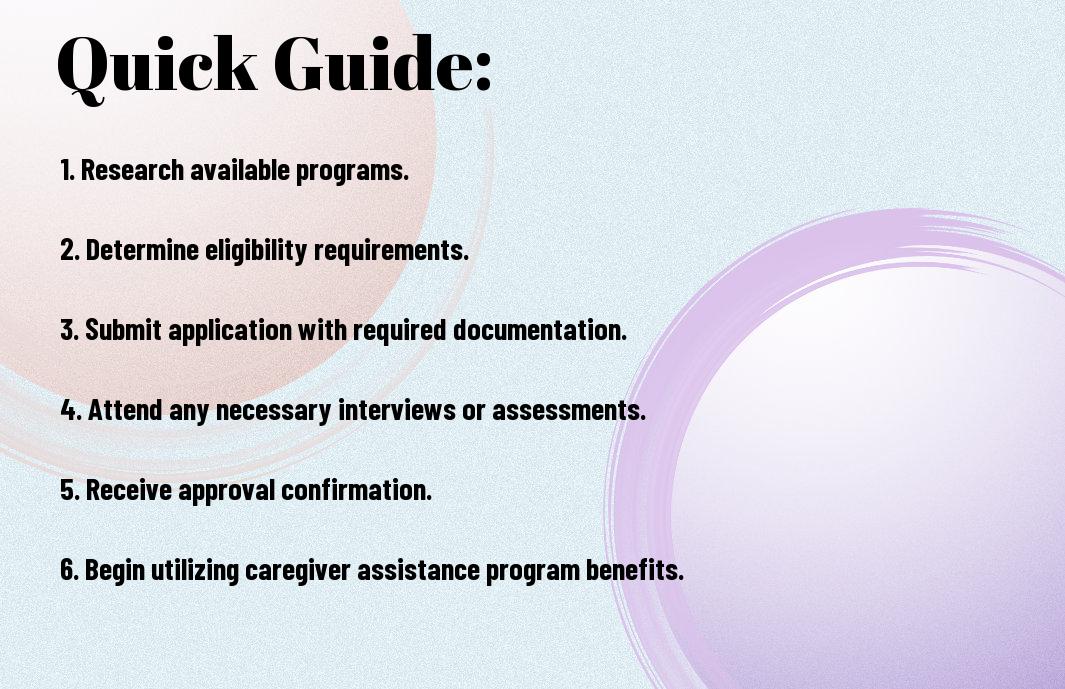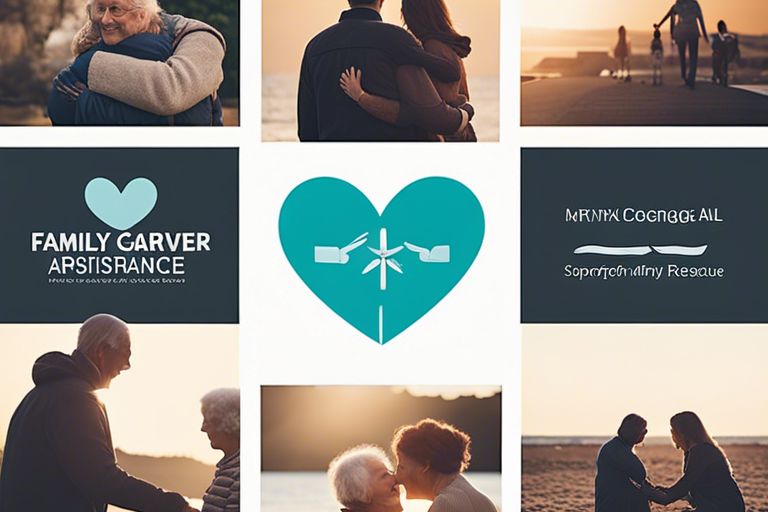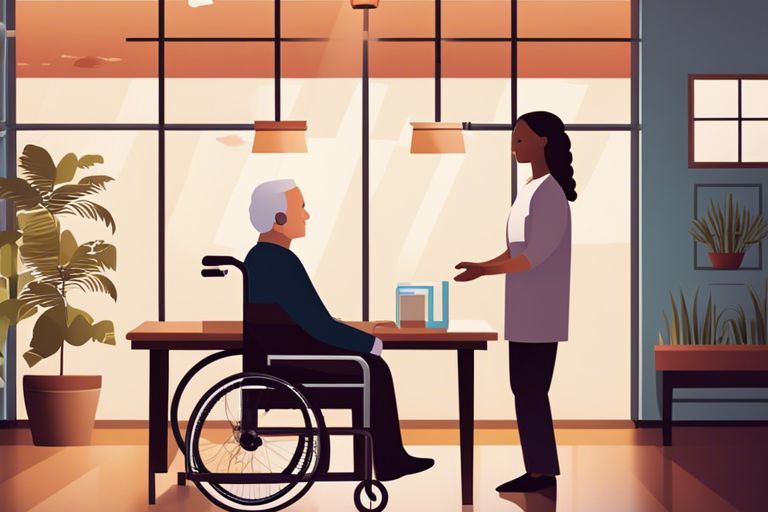Many families face the challenges of caregiving, and navigating through the various assistance programs available can be overwhelming. In this comprehensive guide, we have compiled a list of top family caregiver assistance programs to make your journey as a caregiver more manageable and less stressful. Whether you are looking for financial aid, respite care, support groups, or other resources, this guide aims to provide you with valuable information to help you better navigate the caregiving landscape. For more in-depth information, you can also check out The Caregiver’s Handbook – Order Free Publications.
Key Takeaways:
- Medicaid Programs: Medicaid offers various services for family caregivers, including home and community-based services, respite care, and personal care assistance.
- Area Agencies on Aging: These agencies provide information, referrals, and support services for family caregivers, such as caregiver training and counseling.
- Veterans Affairs Caregiver Support Program: This program offers a range of services for family caregivers of veterans, including financial assistance, counseling, and home-based care.
- Alzheimer’s Association: The Alzheimer’s Association provides resources and support for family caregivers of individuals with Alzheimer’s disease, including educational programs and online support groups.
- Family Caregiver Alliance: This organization offers information, resources, and support services for family caregivers, such as caregiver education and online caregiver support groups.

Types of Family Caregiver Assistance Programs
Before exploring the various types of family caregiver assistance programs, it is imperative to understand the different categories under which these programs are typically offered. Assistance programs for family caregivers can be broadly classified into government-sponsored programs, non-profit organization programs, and private insurance-based programs. Each type of program offers different levels of support and services tailored to the needs of family caregivers.
With government-sponsored programs, family caregivers can access a range of support services provided by local, state, or federal agencies. These programs may include financial assistance, respite care, caregiver training, and support groups. Government-sponsored programs aim to relieve some of the burden placed on family caregivers by offering resources and support to help them better care for their loved ones. The eligibility criteria and available services may vary depending on the specific program and location.
Non-Profit Organization Programs
One of the most significant sources of support for family caregivers comes from non-profit organizations dedicated to helping individuals in need. These organizations offer a variety of services, such as support groups, educational resources, counseling, and referrals to other community resources. Non-profit organization programs are often funded through donations, grants, and fundraising efforts, allowing them to provide valuable assistance to family caregivers at little to no cost.
Organization programs are designed to address the diverse needs of family caregivers, offering emotional support, practical advice, and access to valuable resources. These programs recognize the vital role that family caregivers play in the healthcare system and seek to empower caregivers with the knowledge and skills needed to provide the best possible care for their loved ones. By partnering with non-profit organizations, family caregivers can find a supportive community that understands their challenges and provides much-needed assistance.
Private Insurance-Based Programs
Little is known about private insurance-based programs that offer assistance to family caregivers, as these programs are not as widely publicized as government-sponsored or non-profit organization programs. Private insurance-based programs may provide coverage for certain home care services, medical equipment, or caregiver support services, depending on the policy and insurance provider. Family caregivers who have private insurance coverage should review their policy carefully to understand the extent of available benefits for caregiving services.
Programs provided by private insurance companies can offer valuable financial assistance to family caregivers, helping to offset the costs associated with caring for a loved one. While these programs may not be as well-known as other types of caregiver assistance programs, they can still provide imperative support to families in need. Caregivers with private insurance coverage should inquire with their insurance provider about available benefits and services that can help them in their caregiving journey.
Factors to Consider When Choosing a Program
It is imperative to carefully consider various factors when choosing a family caregiver assistance program. Each program has its own eligibility criteria, level of care provided, financial assistance offered, and support services available. Knowing what to look for can help you determine which program best meets your needs and the needs of your loved one.
Eligibility Criteria
An important factor to consider when choosing a family caregiver assistance program is the eligibility criteria. Some programs may have specific requirements based on the caregiver’s relationship to the care recipient, the care recipient’s condition, or income level. It is crucial to review these criteria to ensure that you qualify for the program before applying.
Level of Care Provided
There’s a range of care provided by different family caregiver assistance programs. Some programs may offer respite care, assistance with daily activities, transportation services, or medical support. Understanding the level of care provided can help you determine if the program can adequately meet the needs of your loved one.
Caregiver support programs often provide emotional and educational support to help caregivers cope with the challenges of caregiving. These programs may offer counseling services, support groups, educational resources, and training on caregiving techniques. It is important to consider the level of caregiver support provided by a program to ensure that caregivers receive the assistance they need.
Financial Assistance Offered
Even though many family caregiver assistance programs are free or low-cost, some programs may offer financial assistance to help offset the costs of caregiving. Financial assistance can help caregivers with expenses such as medical bills, home modifications, or respite care services. It is important to review the financial assistance options available through a program to determine if it can help alleviate some of the financial burdens associated with caregiving.
With the rising costs of healthcare and caregiving services, financial assistance can make a significant difference in a caregiver’s ability to provide quality care for their loved one. By exploring the financial assistance options offered by different programs, caregivers can find support to ease the financial strain of caregiving.
Support Services Available
Available support services can vary widely among family caregiver assistance programs. Some programs may offer counseling, support groups, educational workshops, or caregiver training. It is imperative to consider the support services available through a program to ensure that caregivers have access to the resources they need to effectively care for their loved ones.
Services such as respite care, transportation assistance, and home modifications can greatly benefit caregivers and care recipients. By evaluating the support services available through different programs, caregivers can choose a program that offers the most comprehensive support to meet their unique needs.
Knowing what factors to consider when choosing a family caregiver assistance program can help you make an informed decision and find the support you need to provide quality care for your loved one.

A Step-by-Step Guide to Applying for Assistance
To 14 resources for family caregivers to make managing it all, applying for assistance can seem like a daunting task. However, with the right information and preparation, the process can be much smoother. This step-by-step guide will walk you through the necessary steps to apply for caregiver assistance programs.
Gathering Required Documents
If you are planning to apply for caregiver assistance programs, the first step is to gather all the required documents. Depending on the program, these documents may include proof of your relationship to the care recipient, income verification, medical records, and any other relevant paperwork. It’s imperative to have these documents organized and ready to submit to streamline the application process.
Some programs may require specific forms to be completed by healthcare providers or other professionals. Make sure to reach out to these individuals well in advance to allow for enough time to gather any necessary paperwork. Additionally, keep copies of all documents for your records in case they are requested at a later stage of the application process.
Organizing the required documents ahead of time can help expedite the application process and ensure that you have all the necessary information at your fingertips when completing the application.
Completing the Application Process
Clearly understand the requirements and instructions outlined in the application form before you start filling it out. Make sure to provide accurate and up-to-date information to the best of your knowledge. Double-check all the details to avoid any errors or omissions that could delay the processing of your application.
For instance, some caregiver assistance programs may offer online application options for added convenience. Take advantage of this if available, as it can speed up the process and allow you to track the status of your application more easily. Be prepared to provide additional information or documentation if requested by the program administrators.
Completing the application process requires attention to detail and thoroughness to ensure that all necessary information is submitted correctly. If you encounter any challenges or have questions along the way, don’t hesitate to contact the program administrators for assistance.
Follow-Up and Approval
Approval timelines for caregiver assistance programs may vary, so it’s imperative to follow up on your application status regularly. Reach out to the program administrators if you haven’t received a response within the expected timeframe to inquire about the status of your application.
Documents submitted as part of your application may be reviewed for accuracy and completeness before a final decision is made. If additional information is required, be prompt in providing the requested documents to avoid any delays in the approval process. Once your application is approved, you will receive notification along with details of the assistance you are eligible to receive.
Follow-up communication with the program administrators is crucial to ensure that your application is processed in a timely manner. Stay informed about any next steps and requirements to access the caregiver assistance benefits successfully.
Pros and Cons of Different Programs
| Program Type | Pros and Cons |
| Government-Sponsored Programs | Advantages: – Subsidized or free services – Wide availability – Standardized quality Disadvantages: – Long wait times – Bureaucratic processes |
| Non-Profit Organization Programs | Advantages: – Tailored support – Community resources – Personalized care Disadvantages: – Limited funding – Not available everywhere |
| Private Insurance-Based Programs | Advantages: – Customizable options – Faster access to services – Premium quality Disadvantages: – Costly premiums – Coverage limitations |
Government-Sponsored Programs: Weighing the Advantages and Disadvantages
Some family caregivers may opt for government-sponsored programs due to their subsidized or free services, wide availability, and standardized quality. However, these programs often come with drawbacks such as long wait times and bureaucratic processes. While the financial assistance provided by these programs can be beneficial, the administrative hurdles and delays in receiving support can be frustrating for caregivers who need immediate help.
Moreover, government-sponsored programs may not always offer personalized care or cater to individual needs. The one-size-fits-all approach of these programs can sometimes lead to inadequate support for certain caregivers who require specific assistance or services. Despite the potential advantages, caregivers should carefully consider the limitations and challenges associated with government-sponsored programs before enrolling in them.
It’s important for caregivers to weigh the pros and cons of government-sponsored programs carefully to determine if they align with their caregiving requirements and preferences. While these programs can provide important support and financial relief, the associated delays and lack of personalized care may not be suitable for all caregivers. By evaluating the advantages and disadvantages, caregivers can make informed decisions about the most appropriate assistance programs for their unique situations.
Non-Profit Organization Programs: Evaluating the Benefits and Drawbacks
Clearly, non-profit organization programs offer tailored support, community resources, and personalized care to family caregivers in need. These programs often focus on the individual needs of caregivers and provide assistance in a more personalized and compassionate manner. By leveraging community resources and partnerships, non-profit organizations can offer a wide range of support services that cater to the diverse needs of caregivers.
However, non-profit organization programs may have limitations such as limited funding and availability. Due to their reliance on donations and grants, these programs may struggle to meet the high demand for caregiver support. Additionally, non-profit organizations may not be present in all geographic locations, making it challenging for some caregivers to access their services. Caregivers should consider these drawbacks along with the benefits when exploring non-profit organization programs.
Considering the benefits and drawbacks of non-profit organization programs is crucial for family caregivers seeking assistance. While these programs can offer personalized care and community support, the limitations of funding and availability may impact their effectiveness. Caregivers should assess their specific needs and circumstances to determine if non-profit organization programs align with their caregiving requirements.
Cons: Family caregivers should be aware of the potential drawbacks of non-profit organization programs, including limited funding and availability. While these programs can offer personalized care and community support, the challenges related to funding and geographic reach may affect their accessibility and effectiveness for some caregivers.
Private Insurance-Based Programs: Understanding the Trade-Offs
Understanding the trade-offs of private insurance-based programs is important for family caregivers considering these options. While these programs offer customizable services, faster access to care, and premium quality support, they often come with costly premiums and coverage limitations. Caregivers who value flexibility and expedited services may find private insurance-based programs appealing, but they should also be prepared for the financial commitments and coverage restrictions that come with these programs.
Private insurance-based programs can provide comprehensive coverage and expedited services for family caregivers in need. However, the out-of-pocket costs and restrictions on certain services or providers can pose challenges for some caregivers. Caregivers should carefully review the terms and conditions of private insurance-based programs to ensure they align with their caregiving needs and financial capabilities.
By understanding the trade-offs associated with private insurance-based programs, family caregivers can make informed decisions about their caregiving assistance options. While these programs offer premium quality care and customizable services, the financial implications and coverage limitations should be carefully considered before enrolling in them.
Benefits: Private insurance-based programs provide customizable options, faster access to services, and premium quality support for family caregivers. However, caregivers should weigh these benefits against the costly premiums and coverage restrictions that come with private insurance-based programs to determine if they are the right choice for their caregiving needs.

Tips for Maximizing Program Benefits
Once again, it is necessary to maximize the benefits provided by family caregiver assistance programs. By following some key tips and strategies, caregivers can ensure they are making the most of the support available to them. Here are some suggestions to help caregivers maximize program benefits:
- Stay informed about program updates and changes.
- Attend training sessions and workshops offered by the programs.
- Keep detailed records of caregiving activities and expenses.
- Communicate regularly with program administrators to address any concerns or questions.
- Take advantage of respite care services to prevent caregiver burnout.
Effective Communication with Program Administrators
Little communication can go a long way in maximizing the benefits of family caregiver assistance programs. By maintaining open and regular communication with program administrators, caregivers can ensure they are aware of all available resources and support. Program administrators can provide valuable information on eligibility requirements, program updates, and additional services that may be beneficial to the caregiver and care recipient.
Administrators can also offer guidance on how to navigate the program effectively, including assistance with paperwork, scheduling appointments, and accessing support services. By fostering a positive and collaborative relationship with program administrators, caregivers can better advocate for their needs and ensure they are receiving the support they require.
Coordinating with Healthcare Providers
Administrators play a crucial role in coordinating care between family caregivers and healthcare providers. By serving as a liaison between caregivers and healthcare professionals, administrators can facilitate communication, share important medical information, and ensure continuity of care for the care recipient. This collaboration can help caregivers better understand the care recipient’s medical needs and treatment plan, as well as provide insights into effective caregiving strategies.
Providers can offer guidance on medication management, symptom monitoring, and specialized care techniques, empowering caregivers to deliver high-quality care at home. By working closely with healthcare providers, caregivers can ensure the well-being and safety of the care recipient, while also receiving support and guidance to address any caregiving challenges that may arise.
Expectations
A key aspect of maximizing program benefits is managing expectations and emotions as a family caregiver. Caregiving can be emotionally demanding, and caregivers may experience feelings of stress, guilt, or frustration at times. It is important for caregivers to set realistic expectations for themselves and seek support when needed. By acknowledging their limitations and seeking help when necessary, caregivers can prevent burnout and ensure they are providing the best possible care to their loved ones.
A supportive network of family, friends, and healthcare professionals can offer valuable emotional support and guidance to caregivers. By sharing their experiences and emotions with others, caregivers can alleviate feelings of isolation and stress, leading to a more positive caregiving experience. Additionally, self-care practices such as exercise, meditation, and hobbies can help caregivers manage their emotions and maintain their well-being while caring for a loved one.
Summing up
Following this comprehensive guide to the top family caregiver assistance programs, it is evident that there are a variety of resources available to support those who take on the important role of caring for their loved ones. From respite care services to financial assistance programs, caregivers can find the help they need to navigate the challenges that come with their responsibilities. These programs not only provide practical support but also offer emotional and educational resources to ensure that caregivers feel supported and empowered in their role.
By understanding the different types of assistance programs available, caregivers can better tailor their support to meet their specific needs and the needs of their loved ones. Whether it’s through government programs, non-profit organizations, or community resources, caregivers have access to a wide range of services that can help alleviate the stresses and burdens that come with caregiving. It is important for caregivers to explore these programs and take advantage of the support that is available to them.
In summation, family caregivers play a vital role in our society, and it is crucial that they have access to the help and support they need to fulfill their responsibilities effectively. The top family caregiver assistance programs outlined in this guide offer a comprehensive overview of the resources available, making it easier for caregivers to navigate the complex landscape of caregiving and find the support they need. With the right assistance programs in place, caregivers can provide the best possible care for their loved ones while also taking care of their own well-being.
FAQ
Q: What is a family caregiver assistance program?
A: A family caregiver assistance program is a service or initiative designed to provide support, resources, and assistance to individuals who are caring for a family member or loved one.
Q: What types of assistance programs are available for family caregivers?
A: There are various types of assistance programs available for family caregivers, including respite care services, caregiver support groups, educational resources, financial assistance programs, and counseling services.
Q: How can family caregivers benefit from these assistance programs?
A: Family caregivers can benefit from these assistance programs by receiving support, education, guidance, and resources to help them better care for their loved ones while also taking care of themselves and preventing burnout.
Q: Where can I find information about top family caregiver assistance programs?
A: You can find information about top family caregiver assistance programs by researching online, contacting local healthcare providers, reaching out to community organizations, and exploring government resources such as the Administration for Community Living.
Q: Are there any eligibility requirements to participate in family caregiver assistance programs?
A: Eligibility requirements for family caregiver assistance programs can vary depending on the program and funding source. Some programs may have income restrictions, require a certain level of caregiving responsibility, or specific relationships between caregiver and care recipient. It is recommended to contact the program directly to inquire about eligibility criteria and application procedures.



